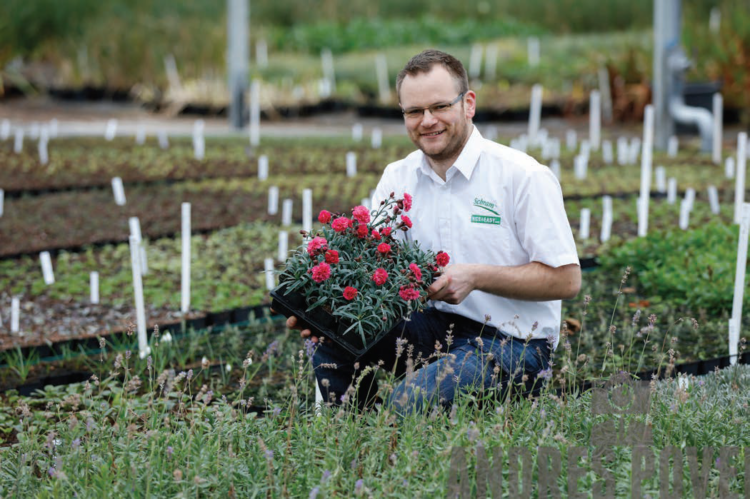Barry Lupton interviews Tim Schram
| Ireland’s founding nursery businesses were family-run affairs. And while this remains the case for the majority, subsequent generations have been slow to pick up where parents left off. The result being closure and sale. “Who can blame THEM?” I hear you ask. Running a nursery is a tough, demanding job, with little thanks and profits often at the mercy of factors way beyond control and challenging to plan for. The reality of nursery operations are far from the romantic ideals of those on the outside. There are benefits of course, but seeing how hard nursery people work, it’s amazing that any children follow in their parents ’ footsteps. Thankfully for the sector, some have taken up the challenge and the opportunity. Tim Schram is one of them. The son of the now-retired nursery founders, Flip and Muriel Schram, has taken the reigns with gusto, building on the knowledge and wisdom his parents passed on with energy, passion, and confidence in the future. Taking a very short break from his schedule Tim talked with me about his own horticultural journey, the rewards and drawbacks of nursery operation and his positive view of what lies ahead. |
Barry: For those unfamiliar with Schram Plants, can you provide some insight into the scope and focus of the business?
Tim: Schram Plants is a wholesale nursery, based in Co Kildare and specialising in supplying the garden centre and landscape market with quality grown herbaceous perennials, alpines, herbs, ferns, and grasses. We have developed the “Nice & Easy”
brand, which is a strong brand aimed at the retail garden centre market.
Barry: Your father moved to Ireland from Holland in the late 1970s and established a landscape design business. What motivated him to move here and subsequently enter the
nursery trade?
Tim: Yes, both my parents wanted to move abroad at the time, they had considered a few countries including France, England, New Zealand and Ireland. They ultimately settled in Ireland in February 1980. They chose Ireland because they liked the countryside and people, and saw an opportunity in the horticulture area. Garden centres, nurseries, and the landscape sector were all fairly undeveloped at that time. The landscape and design element of the business was initially used as cash flow to finance setting up the nursery. The nursery grew as any nursery at the time did, slowly and in stages.
Barry: What motivated you to enter and ultimately take over what is considered a very tough business?
Tim: Growing up in that environment as a child you’d be surprised what you’d observe and learn. I had never intended to enter horticulture at all until sometime in the later stages of
secondary school. I had grown to love the industry and see a future in it.
Barry: You have been involved in the business almost all your life. What are the key differences between the business you run today and the one your parents ran?
Tim: We have seen the industry change significantly over the years. The end consumer, unfortunately, has even less knowledge than in the past and is now really only shopping
on impulse. This has forced nurseries to adapt to growing a product fast, at low cost with high impulse purchase factor. This is not something that I would agree with as it is only a
race to the bottom. While we have had to adapt our offering to suit demands, our core philosophy still remains the same. We want to offer a high-quality good performing product, grown in the Irish climate for the Irish climate. It doesn’t please me to see garden plants being replaced by cheaper, softer ones.
Barry: What are Schram Plants’ US Ps?
Tim: They would be quality, range, and presentation. We feel that the presentation of the product in a garden centre needs to be right to encourage sales. Quality in this day and age is a must. It is essential to have a product looking as good as it possibly can, and presented strongly with the addition of a picture label.
Barry: Operating a nursery can be demanding and can take a toll on an owner’s personal life. How do you manage to keep a good work-life balance?
Tim: It can be difficult. In our season we are busy when the weather is good and quiet during the winter. Since I have a very young family I try to spend as much time with them as I can and try to keep weekends as free as possible. This, of course, means that I take paperwork home to work on at night when the children are in bed. It is just what needs to be done to get through the workload.
Barry: What are the most rewarding aspects of your work?
Tim: There are some elements that can be very rewarding such as procuring a sizeable sale or converting a prospective customer into a new customer. I enjoy the variation in job
tasks. While my work involves 80% office jobs, I look forward to getting out and meeting customers on a weekly basis when visiting with our samples. I usually break up the office day by walking the nursery to inspect product progress.
Barry: Your engagement with horticulture from a young age has provided you with amazing opportunities to learn and build skills. Did you formalise your learning through college or university, and if so, what was your experience?
Tim: I undertook the Batchelor of Science in Horticulture in the Botanic Gardens Glasnevin in conjunction with ITB and concentrated on the nursery module within the course, an element which was conducted in Warrenstown College.
Barry: The disconnect between horticultural education and practice has been well documented over the last decade. While it is great to see Teagasc experimenting with apprentice learning, problems remain. How do you think horticultural education should evolve to reflect sector needs?
Tim: Yes, there are some big issues with the horticultural education system. Looking back on my education I was slightly privileged because I already knew the industry quite well. People entering the system without that background really lack knowledge of the industry. There are some major gaps in the system and I believe there should be mandatory
placements in all major aspects to get a good understanding of it. I think only six people from my year stayed in the trade, and of them three were already in it before starting the
course. The course semester approach is not very well suited to the industry.
Barry: What advice would you give to a young horticulturalist considering a career in nursery operation?
Tim: Familiarise yourself with the industry first. Be prepared to work hard. Too often I hear “Oh it must be lovely working outdoors with flowers in the fresh air” when I say I am a
nurseryman. A commercial nursery is very different from that picture.
Barry: An open market, limited scale, cheap imports, Brexit, weather, currency fluctuation and transport infrastructure are frequently referred challenges faced by Irish nurseries. What’s been your experience?
Tim: These are all quite major factors we face on a daily basis. The availability of online ordering is very attractive and easy for garden centres. However, looking carefully at offered products, they are not always cheaper or better than those home produced, it’s mainly the ease of ordering. The Irish market is shrinking and we all need to consider other market avenues. Transport cost to the UK per trolley is not much more than to certain areas of Ireland. Nurseries here should be able to deliver an order as easily as importing one from The Netherlands. Sadly that is not always the case.
Barry: Some might say that the real opportunities for Irish nurseries are embodied in the challenges above. When you look to the future of Schrams, where do you see the opportunities?
Tim: We would constantly be looking for opportunities be they overseas or here in Ireland. The market is big enough for everyone if we could only import substitute more. There is a lot of product coming into Ireland that can’t be grown here for whatever reason but there are a lot of imports that are grown here and grown here very well. If nurseries look for their point of difference and exploit it the market is big enough. It is also up to garden centres to check their buying habits and purchase more Irish product. This would help
keep money within the industry and the country, as well as supporting local jobs.
Barry: Some say the large multiple retailers have destroyed the plant market, others say they have helped it by shifting plants from a discretionary purchase to a weekly event. What’s your opinion?
Tim: I don’t particularly see the large multiple retailers as having destroyed the plant market. I think they have capitalised on an area that maybe wasn’t done well enough by
certain players. Garden centres shouldn’t try to compete with the multiples directly but should focus more on added value, better quality, bigger plants and most importantly on advice. Plants are not minded in the multiples and consumers know this. Plants have become disposable items to a degree. It is up to garden centres to find their point of difference and entice customers in that way. There is still a huge lack of knowledge at the consumer level that garden centres can address and those that do so are doing very well.
Barry: Opinion is also mixed on experience in dealing with multiples. Some complain it is impossible, others seem to have no difficulty. What’s your experience been?
Tim: I haven’t dealt with any of the multiples. While I have not dismissed the idea of it, I just haven’t approached it head on yet. I have heard mixed reports from within the industry but I think with some decent planning and the right product anything can be achieved.
Barry: Technology is reshaping our lives; how do you see it shaping the future of the sector?
Tim: Technology is also becoming part of gardening. Everyone nowadays has a smartphone and can access everything at the touch of a button. People Google or check YouTube to solve many issues these days, why should gardening be any different? I think knowledge is key and if someone wants to know how to prune a hedge or plant a bulb they will revert to the internet.
Barry: It is generally agreed that plant buying behaviour has changed significantly over the last 10 years. How have you adapted your business model to reflect these changes?
Tim: We have had to introduce high impact sellers to accompany our main offering. It is all high impact and pick-me-ups these days. If the plant has a flower on it, it will generally sell. We still offer the same range but have tweaked quantities. Coloured pots, decorative labels and good POS material have all seen an increase in the last number of years.
Barry: To the outsider, nurseries may appear as eco-conscious businesses; but peat, chemical, plastics and water use all present real environmental challenges and serve to undermine the sector’s environmental credentials. What is your personal philosophy on environmental business practices and how does this translate into practice?
Tim: We try to be as eco-conscious as possible in all our processes. All plastic, card and organic waste are collected and recycled. We collect rainwater from almost every growing
structure for re-use for watering crops. It is very difficult to move away from peat, plastic pots, and plastic labels. Any of the alternatives don’t have the shelf life required for garden
centre benches. We wash, sterilise and re-use any of the pots in-house within our processes to minimise our footprint as much as possible. We have reduced our chemical arsenal in favour of chemical-free biostimulants. I like to think we are doing the best we possibly can in this area.
Barry: Following from the last question, environmental legislation, compliance, and enforcement have tightened in the last decade. In your experience how does legislation filter down to actual practice?
Tim: We have lost many chemicals over the years due to legislation. While we chose naturally to reduce our chemical usage there have been no major alternative chemicals or
otherwise. The Irish horticulture industry is too small to introduce or register a new product. We are probably a step ahead of some nurseries in terms of collecting run-off water, as is currently required in parts of Europe.
Barry: The previous generation of nursery owners demonstrated an understanding and willingness to work together on shared goals. Do you subscribe to the ideals of collaborative working, and if so, what would you like to see happen in the coming years?
Tim: I believe we are stronger standing together. There are some major issues that would need to be overcome in order to achieve this but I believe it is the way forward. Cooperation is definitely the way forward. Maybe it is by cooperation that we can aim to better serve the multiples and indeed the entire industry by import substitution.
Barry: How do you think nursery business can be best supported?
Tim: I think the continuation of investment funding is critical to the industry to allow those that are growing to invest. In my opinion, education is also a key element that needs to be addressed, to attract fresh enthusiastic people into the industry. And as a whole, I feel the entire industry needs to be revived and made trendy. At the moment it is not interesting
enough for people to consider a career in the nursery sector. It is almost impossible to step into a greenfield site and start up a nursery. ✽
WE’D LOVE TO SHARE YOUR STORY
Are you a horticultural entrepreneur, perhaps you are developing a new business idea, working on research and development, bringing a new product to market or reinventing an existing one? If so, we’d like to share your story with the sector.
Drop me a line at editor@hortitrends.com








